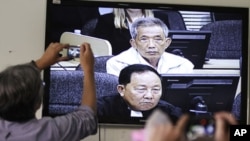The Supreme Court Chamber of the Khmer Rouge tribunal handed a life sentence to Kaing Kek Iev, the torture chief better known by his revolutionary name, Comrade Duch.
The sentence, announced at the court a year and a half after an initial commuted sentence of 19 years for a raft of atrocity crimes, concludes the first case of the court. But the court did not issue strong reparation for victims of the regime, something many had hoped for.
A throng of people crowded the UN-backed tribunal building outside Phnom Penh, anxious to hear the final verdict.
The court is currently trying three more top leaders of the regime, but many critics say this is as far as the hybrid court will go.
More than 12,000 people were tortured and sent to their deaths under Duch’s supervision, a crime judge Kong Srim called “one of the worst cases” in human history.
Duch, who was a math teacher before he joined the regime and converted to Christianity after its fall, appeared somber as he was led out of the court by a guard at the conclusion of the hearing. He will eventually be moved from the tribunal’s detention facility to a state prison until his death.
Kang Ritheary, a defense attorney for Duch, said it was difficult to comment on the final decision, but that there was “some controversy” in the way the court interpreted the law.
“Justice has come after 33 years,” said Chea Leang, the Cambodian prosecutor for the court. “I think impunity has been erased.”
Her UN counterpart, Andrew Cayley, said the prosecutor “got more than we asked for.”
“I think the victims can be satisfied with that,” he said.
Stephen Rapp, US ambassador at large for war crimes, called it a “great day” for the tribunal and “an important step toward justice and reconciliation for the people of Cambodia.”
However, lawyers for the civil party victims who took part in the trial said the court failed to provide the reparations they had wanted. The court decided it would publish and broadly distribute their names.
Rupert Abbott, a researcher for Amnesty International, said the judges had missed a chance to be “more creative,” although he said Amnesty welcomed the final closure of the case.
Members of Kaing Kek Iev’s family declined to comment Friday, but Muth Thim, a former Khmer Rouge soldier and close neighbor of Duch, called the sentence “too heavy.” “He was only following orders,” Muth Thim said.
For survivors of Duch’s prison, like Chum Mey, the final verdict meant closure after a long wait.
“I can be at ease,” Chum Mey said after the hearing. “I am very happy.”
“This is what I’ve prayed for,” said Bou Meng, who also survived the prison, “for my deceased wife, for the people of the world to know, for more than 10,000 Cambodian victims.”




